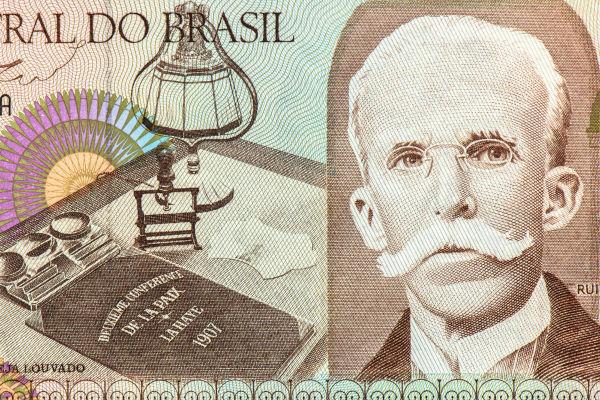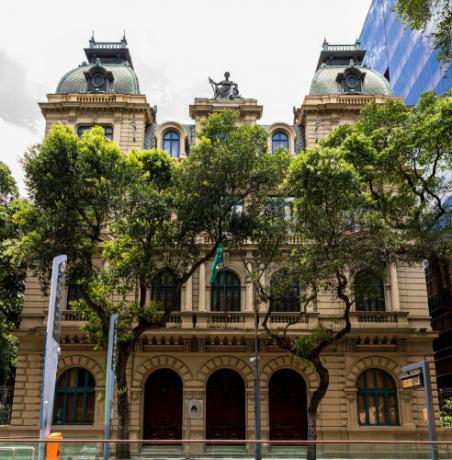RuiBarbosa he was a lawyer, politician, writer and diplomat who had great prominence in the early years of the republic in Brazil. he joined the coup against the monarchy days before the 15th of November, being one of those responsible for the Constitution of 1891, in addition to having been Minister of Justice and Finance. He ran for president in 1910 and 1919, but was defeated on both occasions.
Read too: First Republic - period in the history of Brazil beginning after the 15th of November
First years
Rui Barbosa de Oliveira was born in the city of Salvador, in Bahia, on the day November 5, 1849. His parents were called João José Barbosa de Oliveira and Maria Adélia Barbosa de Oliveira. João José had a career in politics, working for years at the Public Instruction of Bahia. Rui Barbosa's mother, in turn, produced homemade sweets.

From childhood, Rui Barbosa was taught to value reading
and this encouragement made him a great student. During his childhood and adolescence, Rui Barbosa's tutors expressed their satisfaction with his intelligence. In 1864, he finished his regular education and, only two years later, entered the university.In 1866, Rui Barbosa enrolled inlaw School in Recife, Pernambuco. He studied in this city for two years and then decided to move to São Paulo, where he continued his studies. In São Paulo, Rui Barbosa studied with other people who would become notable in our country, such as Alfonso Pena and Joaquim Nabuco.
Adulthood
In 1870, Rui Barbosa completed his law course in São Paulo and decided to return to Bahia. At this point in his life, Rui Barbosa was already known in his circles as a arduous defender of abolition of slave labor, using their training to act in this direction. In Bahia, in addition to working as a lawyer, he also dedicated himself to the work of a journalist.
In addition to working at a private law firm, Rui Barbosa also worked at a local newspaper called Bahia Diary. In 1877 he was elected deputy to theProvincial Assembly and, in the following year, he was elected General Deputy of the Assembly of the Court, located in Rio de Janeiro.
Rui Barbosa's new post made him move to Rio de Janeiro, the capital of Brazil. In addition to defending the abolition of slave labor, Rui Barbosa worked on projects that stipulated changes for Brazilian education. In the General Education Reform, Rui Barbosa proposed a free, mandatory and secular that allowed Brazilians to study from childhood to university.
Rui Barbosa believed in the role of education in the formation of citizens and workers and understood that the progress of Brazil was through a quality educational system. He mainly believed in the importance of science. for the educational development of the country.
Rui Barbosa was also a strenuous defender of the implantation of federalism in Brazil and, therefore, he defended the country's decentralization. Defending the federalist cause made Rui Barbosa reject an invitation to join the Ministerial Cabinet in 1889.
On November 10, 1889, he was part of the meeting that convinced the marshal Deodoro da Fonseca to support the uprising against the monarchy. Rui Barbosa joined on the following day, November 11th. With the Pclaim of rpublic, held on November 15, 1889, Rui Barbosa placed himself as one of the big names in the consolidation of the new regime in Brazil.
Accessalso: The trajectory of three great defenders of abolitionism in Brazil
First Republic
With the establishment of the Republic, Rui Barbosa was invited to assume the Ministry of Finance and Justice, functions he accepted. In addition, he played an important role in the elaboration of a new constitution for Brazil, promulgated in February 1891. The new Constitution was written by a commission of five people, and Rui Barbosa was responsible for the final revision of the text.

The Bahian politician was a supporter of the liberal exit to the country and, therefore, he advocated the establishment of a republic that would care for individual liberties. Therefore, he was a strong opponent of the exit positivist, which advocated the establishment of an authoritarian republic. Therefore, he believed that the best way to guarantee the institutionalization of the republic would be through a constitution.
Head of the Ministry of Justice, Rui Barbosa was inspired by the model established in the United States and proposed the creation of a Federal Supreme Court (STF). The Bahian politician also proposed that this court would be responsible for controlling the laws enacted and the acts taken by members of the Executive and Legislative powers, in addition to placing the STF as the guardian of individual freedoms in the Brazil.
In fact, it was Rui Barbosa's first request for habeascorpus of the court's history. Rui Barbosa's action took place in defense of opponents and critics of the then president Floriano Peixoto. Rui Barbosa, as mentioned, was a critic of authoritarianism and opposed the authoritarian measures that were taken by Deodoro da Fonseca and Floriano Peixoto.
Stranding
In charge of the Ministry of Finance, Rui Barbosa promoted controversial measures. The first controversial action was the burning files of slavery, held in December 1890. Historians point out that this measure was intended to prevent former slave owners from suing the State in search of compensation under the Golden Law.
The measure, however, is subject to much criticism, as it can be seen as an attempt to erase the country's slave-holding past. In addition, this action prevented many former slaves from entering the courts, claiming compensation for irregularities committed during their imprisonment.
The other controversial measure taken by the finance minister was a series of changes he promoted in the area of the economy. Rui Barbosa defended that Brazil should stop being a country dependent on coffee and agriculture, and should encourage industrial development.
The minister, then, decreed a greatremodelingfinancial, which allowed private banks to issue paper money, in addition to establishing conditions for expanding credit and encouraging the creation of companies.
These measures created a climate of fakeprosperity in Brazil, which was marked by the emergence of corporations and large speculation on the Stock Exchange. This scenario encouraged many, hoping for prosperity with business, but what was seen was the opposite. Soon, the shares of the fictitious companies started to lose value, which generated a strongcrisiseconomical.
This crisis was marked by increaseinflationary and devaluationgivescoin in relation to the pound, in addition to the bankruptcy of a large part of the companies that emerged during this period. This economic crisis became known as Stranding, being resolved only during the government of Prudente de Morais.
Accessalso: How was the life of ex-slaves after the Golden Law?
Last years
At Rui Barbosa's criticism of Floriano Peixoto's government forced the Brazilian politician into exile because he was threatened with arrest by the marshal's government. The government accused Rui Barbosa of being one of the mentors of the Armada Revolt, movement that broke out in the Navy. During his exile, Rui Barbosa passed through Buenos Aires, Lisbon, Paris and London. He returned in 1895, during the government of Prudente de Morais.
Even away from the country, Rui Barbosa was remembered by voters and received spontaneous votes in the 1894 presidential election. He still received spontaneous votes in the elections of 1898, 1902, 1906, 1914, 1918 and 1922. This means that, even though he is not an official candidate, Rui Barbosa was remembered by voters who spontaneously voted for him.
The two elections that Rui Barbosa officially registered his candidacy for the presidency were in the 1910 elections, in which he competed with Hermes da Fonseca, and from 1919, in which he played with Epitacio Pessoa. In all these elections, Rui Barbosa was defeated, and his big moment came in the 1910 election.
In that election he launched the “civilist campaign”, a campaign that defended civilians in the office of president. This campaign aimed to target his main adversary, Marshal Hermes da Fonseca. Defeated, Rui Barbosa made accusations against electoral fraud, a very common practice throughout the First Republic.
Rui Barbosa still went founding member of the Brazilian Academy of Letters, in 1897, being president of that body from 1908 to 1919. too occupied thepresidency of the Brazilian Lawyers Institute from 1914 to 1916. He was also internationally recognized on account of a diplomatic mission he carried out in The Hague, Netherlands, in 1907.
From 1890 to 1922, Rui Barbosa shared his numerous obligations with his position as senatorby the state of Bahia. In 1922, he was even invited by President Artur Bernardes to assume the Ministry of Foreign Affairs, but he rejected the invitation because he was in poor health. In March 1, 1923, died in Petropolis, by complications caused by a pneumonia.
Image credits
[1] Luis War and Shutterstock
By Daniel Neves Silva
History teacher
